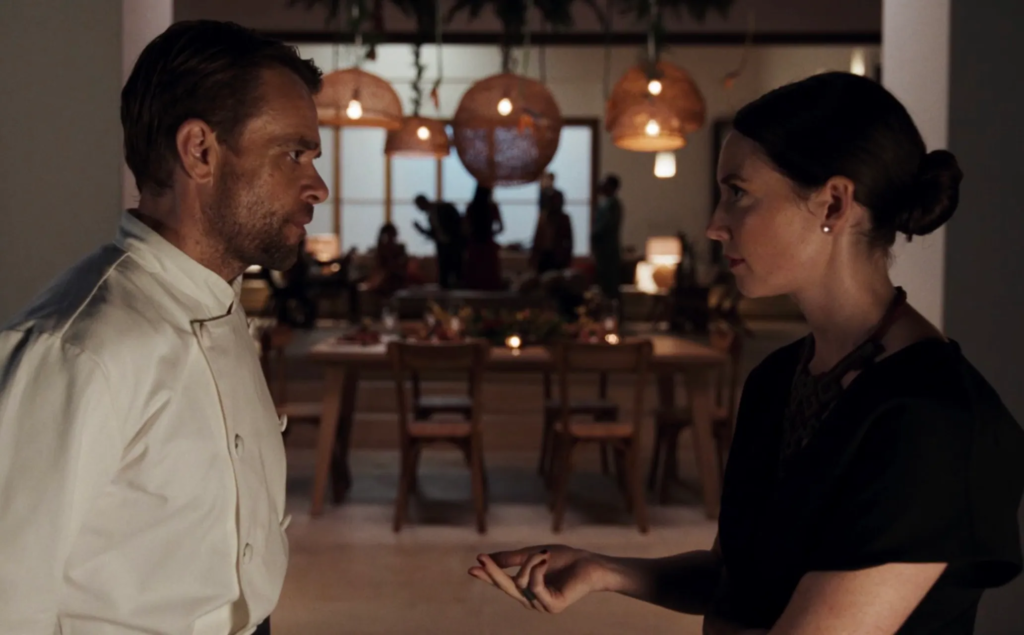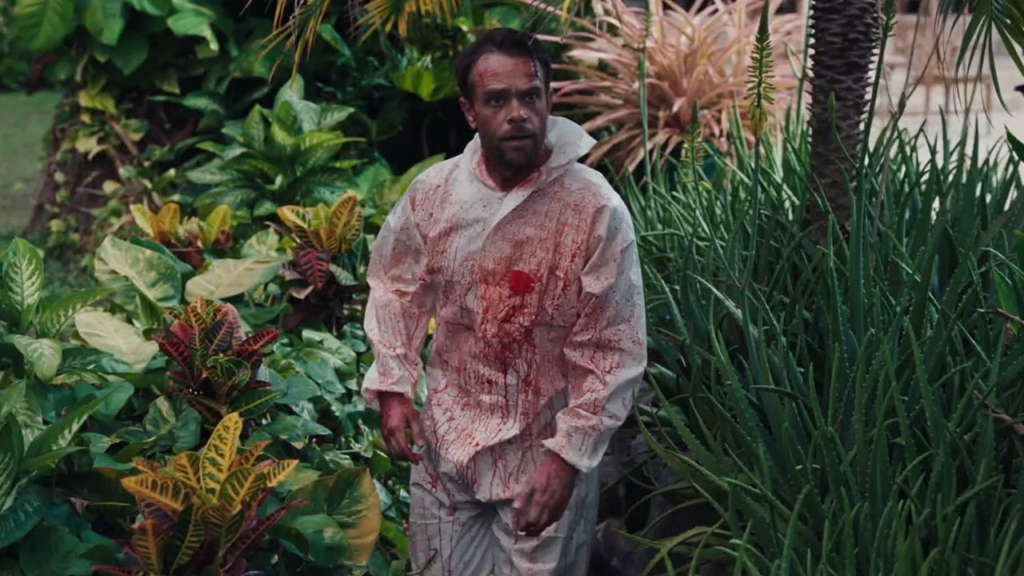Director: Nicholas Tomnay
Writer: Nicholas Tomnay
Stars: Nick Stahl, Tamsin Topolski, Randy Vasquez
Synopsis: A down-on-his-luck chef with gambling problems flees to a Latin American villa, where he assumes the identity of another man.
In What You Wish For, Ryan (Nick Stahl) and Jack (Brian Groh), once flatmates in culinary school, have gone down very different paths over the past 12 years. Ryan is drowning in debt and on the run from a dangerous pursuer, seeking refuge in Latin America with his old friend, Jack. Meanwhile, Jack enjoys a lavish lifestyle, cooking for the world’s elite, but he’s secretly discontent with his life. When Ryan arrives, envious of Jack’s apparent success, he stumbles into an opportunity to take over Jack’s identity. However, Ryan soon discovers that Jack’s glamorous job involves more than just preparing exquisite meals, revealing hidden dangers and complexities behind the luxurious facade.

Nicholas Tomnay’s sharp-edged black comedy What You Wish For skillfully taps into the current trend of culinary arts in film and television, epitomized by films like The Menu. While it departs from the typical professional kitchen setting, the film maintains a strong focus on the culinary craft through protagonist Ryan. Early scenes highlight Ryan’s cooking prowess, starting with a simple yet expertly made omelette and escalating to a high-stakes risotto challenge with Jack to impress their friend Alice (Penelope Mitchell). As secrets unfold and the story darkens, the introduction of a flirtatious Australian traveler (Penelope Mitchell) and a keen local detective (Randy Vasquez) sets the stage for escalating tension.
The agency handling Jack is accustomed to trouble and swiftly steps in to ensure the smooth continuation of their event once Ryan assumes Jack’s identity. Imogene (Tamsin Topolski), with her impeccable English demeanor and unthreatening yet elegant wardrobe, instructs Ryan on his new responsibilities and the severe consequences of failure. Throughout, Tomnay integrates discussions on ingredients and cooking techniques, adding authenticity and engaging food enthusiasts without being didactic.
What You Wish For plunges into the ageless notion of hidden complexities, akin to an iceberg with most of its mass concealed beneath the surface. Jack’s job initially seems like a dream come true for Ryan, but beneath this enticing exterior lies a tumultuous and perilous reality. The film deftly reveals the harsh truth that one can never fully comprehend another’s struggles without living their life. As Ryan assumes Jack’s identity, he also inherits his dangerous circumstances, causing the audience to wince as he spirals from one calamity to the next. This relentless descent creates a gripping narrative, as viewers, much like Ryan, search desperately for a way out of the chaos.
Yet, amid the swirling turmoil, there are flickers of hope and self-discovery. Ryan’s initial conversations with Jack highlight his dissatisfaction and frustration with his culinary career. However, in the crucible of his new situation, Ryan discovers a latent passion for cooking, culminating in the meal of his life. This newfound skill poses a troubling question: should he embrace this opportunity and pursue his culinary calling, or should he escape the looming dangers? What You Wish For weaves a story of aspiration, desperation, and the bittersweet taste of success, leaving the viewer contemplating the true cost of dreams realized.

Nick Stahl’s portrayal of Ryan is nothing short of exceptional, reaffirming his prowess as an actor who shines brightest in the independent film arena. Under the meticulous guidance of director Nicholas Tomnay, Stahl undergoes a remarkable transformation, presenting a performance so fresh and nuanced that it feels like we are witnessing his talent for the first time. He sheds any traces of his previous roles, fully immersing himself in the character of Ryan. Stahl expertly captures the dual facets of Ryan’s persona: his adeptness in the culinary arts and his escalating sense of desperation and fear. What stands out is Stahl’s restraint; he avoids melodrama, instead opting for a subtle approach that conveys depth and authenticity. As a chef well-versed in handling high-pressure situations, Ryan maintains a calm exterior even as chaos envelops him. Stahl’s ability to sustain this composed demeanor, while hinting at the turmoil beneath the surface, adds a compelling layer to his character and keeps the audience deeply engaged.
Ryan’s ability to think quickly and adapt to challenging situations is captivating, ensuring that the audience remains engaged throughout What You Wish For. If he were to react hysterically to each escalating crisis, the film might risk becoming farcical. Instead, Stahl’s portrayal of Ryan as outwardly composed, yet with an underlying tension, injects a subtle, almost incredulous humor that provides a welcome release from the film’s intensity.
What You Wish For offers a thought-provoking exploration of the dangers of chasing aspirations without considering the consequences. It presents a fresh take on the age-old warning to be cautious about what one wishes for. As a darkly entertaining thriller, the film skillfully reveals that the allure of a seemingly better life often conceals deeper complexities. Ultimately, it serves as a compelling reminder that things aren’t always as they seem, leaving audiences both satisfied and reflective.





